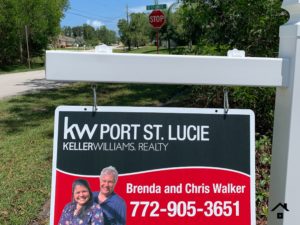If you own a vacant lot or buildable land in Florida, you might want to check up on it to make sure thieves didn’t sell your vacant land out from under you.
It’s a common scam, but not common enough that everyone knows about it. They still occasionally get through the whole process and steal it through fraudulent sale.
Fake sellers approach us by email to sell their lot. But we’ve been able to figure them out.

Our Experiences with Vacant Land Fraud
We are Realtors in the Port St. Lucie area of Florida. Selling vacant land is part of what we do.
We occasionally receive emails from strangers wanting to sell their land.
However, with so much seller fraud for vacant land in Florida, we are instantly suspicious of email requests, particularly from free email accounts like Gmail, Hotmail, or Zohomail.
We check the Port St. Lucie or St. Lucie County property records to find the owner’s mailing address. We do an obituary search in that city. We run some skip trace skills we have to find social media and phone numbers.
Recently, one seller has been deceased since 2018. I managed to find a family member who prevented their land from being stolen by the imposter. It had gotten listed by an unsuspecting agent.
Another vacant land seller who was 10 years deceased was emailing us beyond the grave. I’ve tried to find a family member, but no luck in making contact.
Our First Experience of Vacant Lot Fraud
Our first experience happened when an email came in asking us to evaluate their vacant land in Port St. Lucie. We researched the property records to confirm ownership and requested their IDs by email. We quickly received them. We continued with emails about FIRPTA requirements and comparable properties.
They invited us to list their property. From first contact to listing signed was under 24 hours.
Our spidey sense started going off. Something wasn’t right.
They lived in an Asian County that uses non-western characters on the identification forms we had been emailed. We asked friends from that country to read them.
My friends from that country were suspicious that the IDs provided were fake. For example, the seller’s name translated to “professor, doctoral supervisor.” The wife’s passport used lettering that no international passport uses and her passport number seemed unlikely. Later clues came to light that helped us find the website where these fake IDs were bought.

They would text us in the Eastern Time Zone, though they claimed to be halfway around the world, where it would be non-normal working hours for them.
They would not agree to an on-screen video call with us. Given the language of their country of origin, I arranged for a translator to sit with us if we ever got to a call.
We sent a traceable FedEx letter to the owner. It took a few days, but the real owner’s lawyer reached out to us saying that the owner did not contract to list the property. We were dealing with fraudulent sellers.
We canceled the listing.
When the vacant parcel got listed again with another Realtor a few months later, we shared our story with that Realtor. Eventually, they researched it deeper and found that they too were being scammed.
Protect Your Vacant Land from Fraud
We want to help you protect your vacant land from being sold out from under you. The scammers are pretty sophisticated, using email, photoshopped identification forms, fake notaries, and even unsuspecting banks. They can occasionally be successful.
If you own vacant land, contact a local realtor to put a monitor on it. If your land is here in South Florida, contact us.



